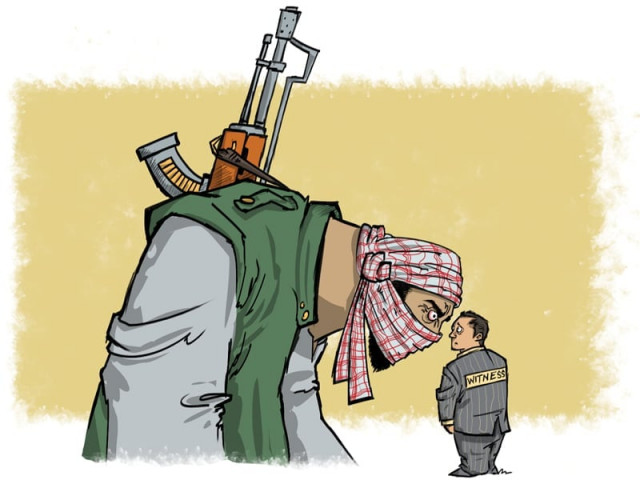Witnesses to be allowed new identities in assembly’s long-pending bill
Law minister talks to media about witness protection, devolved departments and Lyari IDPs.

"The government wanted to consult all stakeholders before making the [witness protection] bill into a law so I consulted with the SHC CJ," Law minister Dr Sikandar Mandhro. ILLUSTRATION: JAMAL KHURSHID
The long-pending Sindh witness protection programme may finally see the light of day as the provincial law minister said the assembly is likely to approve it in the upcoming two or three sessions.
“The government wanted to consult all stakeholders before making the bill into a law, he said. “After taking charge of my office, I consulted with the Sindh High Court chief justice and now the draft is ready to be tabled in the assembly,” Dr Sikandar Mandhro told a press conference on Saturday.
The Sindh Home Department prepared the draft in October, 2010. Later in January 2011, the Sindh cabinet also approved the draft summary. The provincial government kept, however, delaying its enactment for two and a half years until now. Mandhro said the newly elected government would have passed the bill in its initial three sessions but it was delayed due to the budget debate.
The programme ensures safety for witnesses, investigators, prosecutors and judges in major criminal cases, including terrorism and target killings. Protection is given during and after a trial, while some witnesses may also be provided new identities.

Devolved departments
After the passage of the 18th constitutional amendment, the Sindh government was expected to legislate to bring dozens of devolved organisations and responsibilities under its purview. But only a few of them were merged in the provincial government during the three years between April 2010 and March 2013.
The transferred subjects include labour, women and child rights, immunisation programme, health, drugs and medicines regulation, education policy and curriculum, highways, agricultural income tax, Zakat, trade unions, shipping on inland waterways, evacuee property, films, soil survey, etc.
The law minister said, however, that the government has prepared 35 legislative drafts to absorb the former federal subjects into the province.
“They just have to go through the three stages of enactment, i.e, study of drafts by the MPAs, debate in the assembly and finally their passage,” he said, without giving a timeline for the enactment of these laws.
He did even not say which of the organisations, subsidiaries or initiatives are on the government’s priority list for legislation.
Lyari IDPs
Mandhro, who is a member of the committee to rehabilitate displaced Kutchi families of Lyari, said that “outside criminal elements” are infiltrating in Lyari and perpetrating violence to divide the two sides. “I have personally spoken to Kutchi and Baloch representatives,” he said. “They have been living together in the area for centuries and they say they hold no grudges against each other.”
The law enforcers have mapped the points from where the criminals are penetrating into the area, Mandhro said, adding that these points will be blocked with police and Rangers pickets. The law minister identified union councils number 1, 2, 6 and 8 as the ones infested with violence.
According to him, 450 to 500 displaced people of Lyari were living in Thatta and another 150 in Badin. “I have visited these families and they haven’t complain about relief issues. They just want to go back to their homes to observe Ramazan and celebrate Eid.”
Published in The Express Tribune, July 14th, 2013.



















COMMENTS
Comments are moderated and generally will be posted if they are on-topic and not abusive.
For more information, please see our Comments FAQ